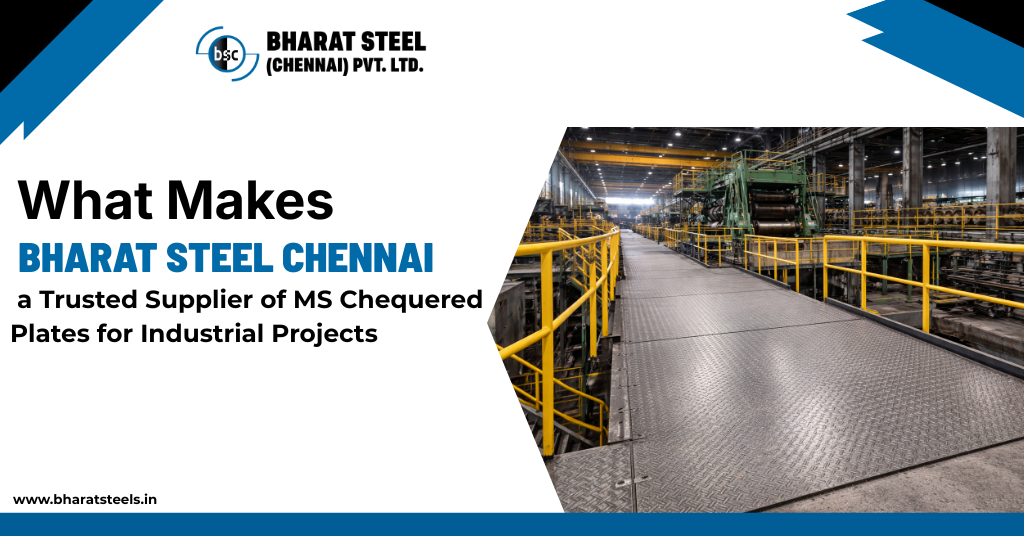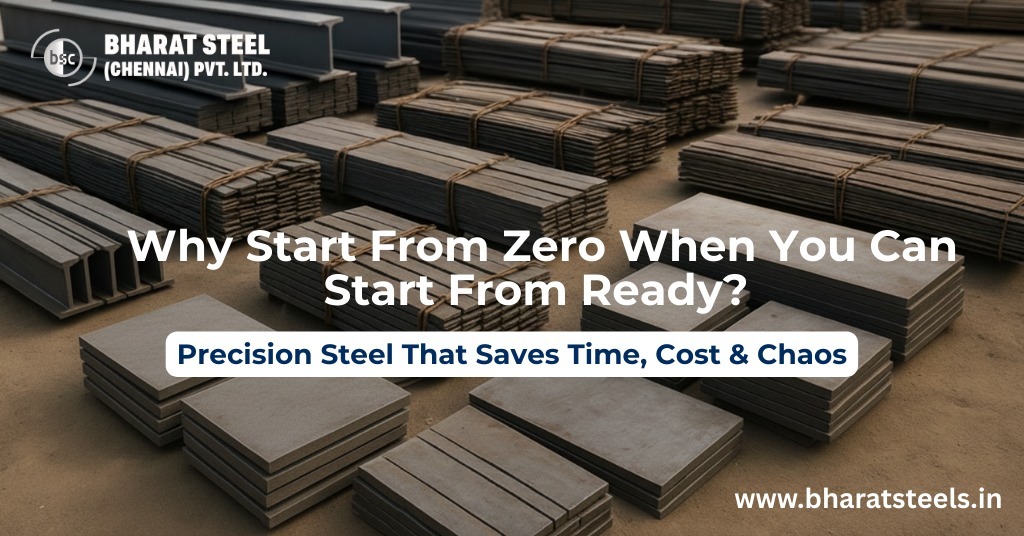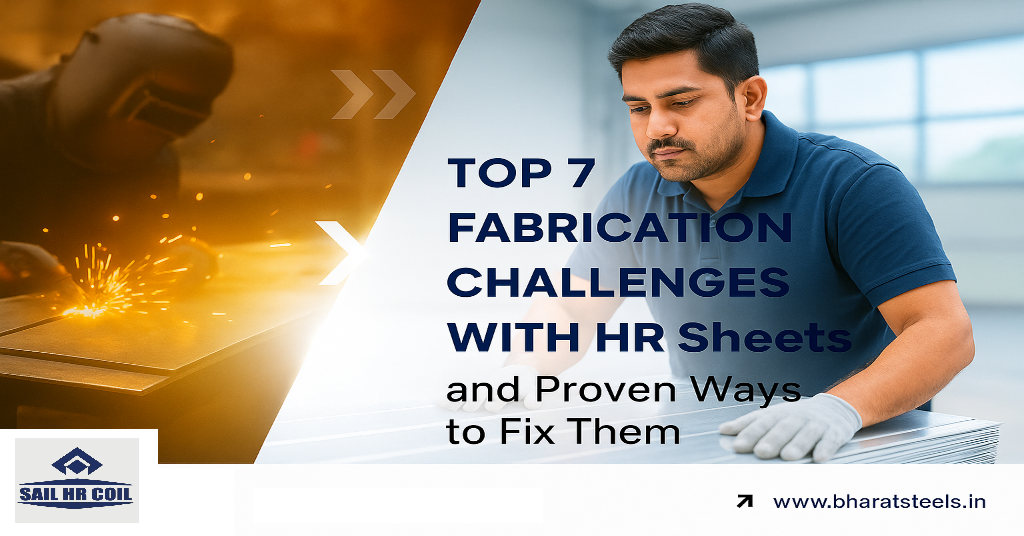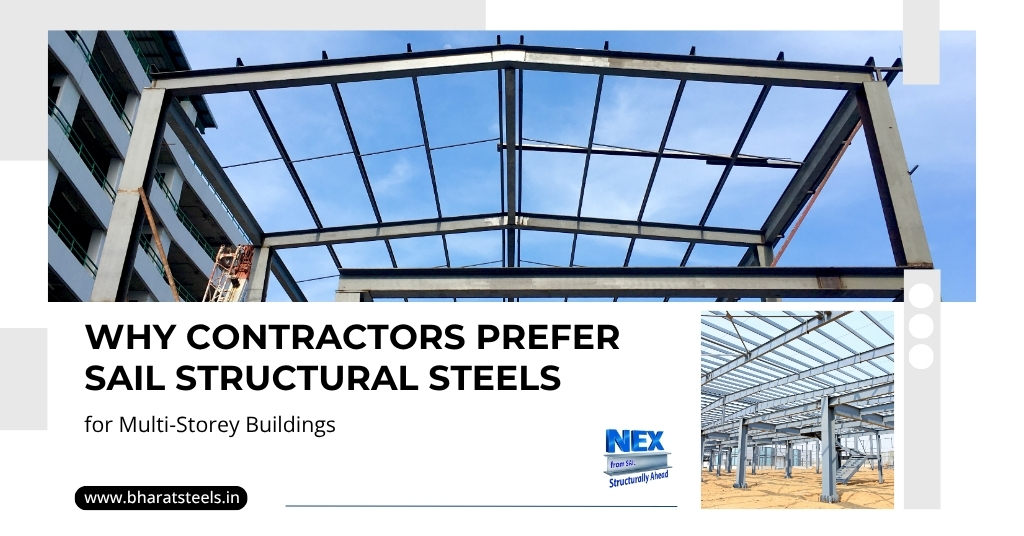Industrial project flooring and structural materials affect safety, durability and long-term operation costs. Therefore, the selection of materials has a major effect on safety, load-bearing capacity and reliable performance (slip resistance) for MS Chequered Plates, which are very important in industrial environments.
For industrial customers in or near Chennai, there is more to a sourcing decision than selecting an appropriate material.They must also select a supplier who has an understanding of quality requirements, lead times and real world site conditions. Bharat Steel Chennai has established itself as an industry leader in supplying MS Chequered Plates to industrial sectors, based on their reputation for being able to meet those needs.
Importance of MS Chequered Plates in Industrial Projects
Mild steel chequered plates are used as a safety feature in areas where slip and load-bearing safety is essential. M.S. chequered plates are most often used in:
- Factories (office floors and factory flooring)
- Industrial walkways and platforms
- Stairways and ladders
- Mezzanine floor
- Maintenance access areas
The raised surface pattern enhances traction, reducing slip potential in those areas where there is exposure to wet oils, mud, or heavy use.
Reliable Availability of MS Chequered Plates for Industrial Scale Projects
Industrial projects often require bulk quantities within strict timelines. Any delay in material supply can disrupt execution schedules.
- A large inventory of standard MS Chequered Plates
- Ability to provide large quantities and repeat orders
- Consistent supply for phased projects
These characteristics are extremely important to manufacturers, distributors, and infrastructure projects, where timely installation of the floor is a major concern.
Advantage of Local Industrial Market Understanding
Industrial operating conditions in Chennai and nearby regions are influenced by:
- Humidity and temperature fluctuations;
- High usage of heavy equipment;
- Constant foot traffic on and around equipment.
Having local market knowledge will enable suppliers to foresee and address these challenges more effectively than suppliers without this advantage. Bharat Steel Chennai has an understanding of the regional industrial market based on its experience with the area, enabling it to recommend appropriate Chequered plates for long-term success on the local level.
Cost Effectiveness Through Long-Term Performance
Experienced industrial purchasers will analyze materials on a lifecycle value basis rather than on an initial price. Using quality MS Chequered Plate products will result in lower total costs to the end user since these plates will:
- Minimize wear and deformations
- Reducing how often a replacement is required
- Reducing the need for maintenance
- Provide a longer service life than average materials
By supplying consistent and durable material, Bharat Steel Chennai supplies SAIL MS Chequered plates which supports cost-effective industrial operations.
Bharat Steel Chennai’s Approach to Supplying MS Chequered Plates
Bharat Steel Chennai is considered one of the most reputable sources for MS chequered plates due to their dedication to consistency in their product and identifying the best applications based upon how you intend to use them on site.
As an industrial buyer, you will receive assistance in determining what thickness and load carrying capacity you need through load requirements, foot traffic levels and conditions for where the product is going to be installed. By following this guideline, you are assured that the MS chequered plates you have selected will function as required for the entire project you have been assigned.
Bharat Steel Chennai far more than gives you an order form. Our process includes:
- Understanding the type of application of the chequered plate
- Recommending a thickness (mm) and size for the application
- Providing the same consistency through all batches of products supplied
- The ability to select the type of chequered plate material based upon site conditions.
Our process in providing the MS chequered plates will help ensure that all projects will not only utilize adequate material, but also eliminate any costly replacement of materials that underperform.
How Bharat Steel Chennai Supports Buyers in Choosing MS Chequered Plates
Selecting the right MS Chequered Plates requires evaluating multiple factors.
Bharat Steel Chennai assists buyers by guiding them on:
- Load bearing requirements.
- Thickness of these plates to ensure proper performance.
- Plate dimensions with respect to the intended application.
- Designed for high traffic zones with load stress
By following this guideline, customers will reduce the possibility of purchasing too much plate material or not achieving the required level of performance later.
Conclusion:
When carrying out an industrial project, the materials used are expected to perform consistently under difficult conditions. Therefore, MS Chequered Plates have an essential role in ensuring the safety, durability and efficiency of a business’ operations.
Bharat Steel Chennai has established itself as the preferred Supplier of MS Chequered Plates by providing:
- Quality Consistency
- Reliable Material Availability (On Time)
- Application- Based Solutions Support
- Long- Lasting Value to Industrial Buyers
Purchasing MS Chequered Plates from the right supplier can ultimately affect the safety, performance and durability of an industrial project Contact Bharat Steel Chennai for all your industrial needs.
Frequently Asked Questions
Q.What are MS Chequered Plates used for in industrial projects
A.MS Chequered Plates are used for industrial flooring, walkways, platforms, staircases, mezzanine floors, and maintenance areas where slip resistance and load strength are required.
Q.Why are MS Chequered Plates preferred over plain steel plates
A.MS Chequered Plates provide better grip due to their raised pattern, making them safer for areas exposed to oil, water, dust, and heavy foot traffic compared to plain steel plates.
Q.What thickness of MS Chequered Plates is commonly used in industrial applications
A.The thickness depends on load and usage. Light duty walkways use thinner plates, while factories, platforms, and high traffic areas require thicker MS Chequered Plates for strength and durability.
Q.How do MS Chequered Plates improve industrial safety
A.MS Chequered Plates reduce slipping risks, improve worker movement, and help maintain compliance with industrial safety standards, especially in wet or oily environments










